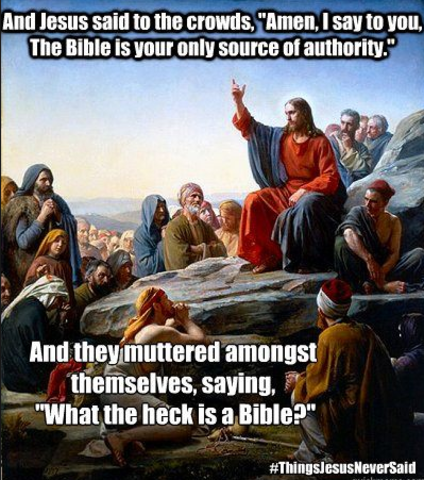You may shout 'Strawman' until the cows come home, but this is not a strawman.
None of those verses even mentions "Holy Tradition," "Sacred Tradition," or even "Tradition." And none of them refers to the theory that IS Holy Tradition.
Yes, it does say Tradition. You either didn't read it or you are blind.
That said, I am willing to read any argument in favor of Holy Tradition, but throwing out a verse that doesn't refer to it will not do that job.
(And, no, I don't see any signatures. That's optional.)
There is a link that you ignored containing several verses on Tradition that you say is not there, in post # 60. Here it is again.
"Tradition" Isn't a Dirty Word
Here is another suitable definition:
First of all, one might also loosely define tradition as the authoritative and authentic Christian history of theological doctrines and devotional practices. Christianity, like Judaism before it, is fundamentally grounded in history: in the earth-shattering historical events in the life of Jesus Christ (the incarnation, miracles, crucifixion, resurrection, ascension, etc.). Eyewitnesses (Lk 1:1-2, Acts 1:1-3, 2 Pet 1:16-18) communicated these true stories to the first Christians, who in turn passed them on to other Christians (under the guidance of the Church’s authority) down through the ages. Therefore, Christian tradition, defined as authentic Church history, is unavoidable.
That is in the link you can't read for some reason.
"Tradition" Isn't a Dirty Word
This is one definition from the catechism:
CCC 76 In keeping with the Lord's command, the Gospel was handed on in two ways:
- orally "by the apostles who handed on, by the spoken word of their preaching, by the example they gave, by the institutions they established, what they themselves had received - whether from the lips of Christ, from his way of life and his works, or whether they had learned it at the prompting of the Holy Spirit";(THIS IS TRADITION)
- in writing ...
Click on
CCC 76 for more context.
Mark 13:31 – heaven and earth will pass away, but Jesus’ Word will not pass away. But Jesus never says anything about His Word being entirely committed to a book. Also, it took 400 years to compile the Bible, and another 1,000 years to invent the printing press. How was the Word of God communicated? Orally, by the bishops of the Church, with the guidance and protection of the Holy Spirit.
Mark 16:15 – Jesus commands the apostles to preach the Gospel to every creature. But Jesus did not want this preaching to stop after the apostles died, and yet the Bible was not compiled until four centuries later. The word of God was transferred orally.
Luke 10:16 – He who hears you (not “who reads your writings”), hears me. The oral word passes from Jesus to the apostles to their successors by the gracious gifts of the Holy Spirit. This succession has been preserved in the Holy Catholic Church.
Luke 24:47 – Jesus explains that repentance and forgiveness of sins must be preached (not written) in Christ’s name to all nations. For Protestants to argue that the word of God is now limited to a book (subject to thousands of different interpretations)
is to not only ignore Scripture, but introduce a radical theory about how God spreads His word which would have been unbelievable to the people at the time of Jesus.
More here
ORAL APOSTOLIC TRADITION - Scripture Catholic
All this isn't even close to your re-definitions, preconceived notions and straw man fallacies.




 Well, I can see the difference between traditions and Tradition, even if you cannot.
Well, I can see the difference between traditions and Tradition, even if you cannot.
